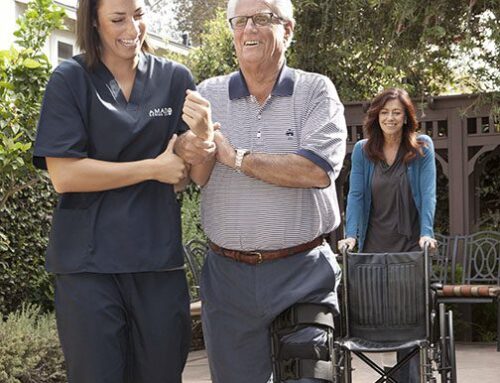As seniors age, transportation can become a significant challenge. Around 600,000 older adults stop driving each year, says the National Association of Area Agencies on Aging (N4A). Yet it’s important for seniors to remain mobile to visit their dentist or doctor, pick up groceries or prescribed medications and other necessities, or to maintain their social independence with friends and family. The N4A estimates about 40% of family caregivers spend at least five hours per week providing or arranging transportation for a senior loved one.
For those seniors 65 and older who are living alone or far from family members or friends who can help, the loss of transportation can be a major obstacle to maintaining independence and quality of life. With a little research, seniors and family caregivers can find safe and accessible travel options like those explored below:
How Seniors Can Get Home Safely After a Hospital Discharge
For seniors who have recently been discharged from the hospital or are undergoing rehabilitation, getting home safely is paramount. Depending on the senior’s mobility and health, public transportation may not be a viable option. Additionally, many seniors may need assistance getting in and out of vehicles or navigating the hospital, rehab center or skilled nursing facility.
One solution to this senior care challenge is the use of medical transportation services. Many hospitals and rehab centers offer transportation services specifically designed for seniors and those with mobility issues. These services typically provide door-to-door transportation, as well as assistance getting in and out of vehicles and navigating the hospital or rehab center.
Elderly Non-Drivers Getting to and from Doctor’s Appointments
For seniors who need to see their doctor regularly, transportation can be a significant barrier. Depending on their mobility and health, public transportation may not be an option, and many seniors may not have access to a car or a caregiver who can provide transportation.
One option is to use a ride-sharing service such as Uber and Lyft. These services can be accessed through a smartphone app, making them easy to use for seniors who are comfortable with technology. Additionally, many ride-sharing services offer senior-friendly features such as larger vehicles and drivers trained to assist seniors. Seniors who don’t use a smartphone can arrange for Uber or Lyft rides through the GoGoGrandparent services company.
According to LTC News, it’s worth checking whether non-emergency medical transportation (NEMT) can be covered by a senior’s Long-Term-Care insurance policy or Medicare Supplement Plans.
Senior Shopping Trips and Running Errands
For seniors who no longer drive, getting to the grocery store or other essential shopping destinations will present many obstacles. Depending on their mobility and health, public transportation may not be a viable option, and many seniors may not have access to a car or a caregiver who can provide transportation.
An alternative that has grown in popularity thanks to the pandemic is signing up for a grocery delivery service. Many grocery stores now offer online ordering and delivery services, making it easy for seniors to have groceries and other essentials delivered right to their doorstep. Additionally, there are several third-party delivery services that specialize in delivering groceries and other essentials to seniors and those with mobility challenges.
Volunteer Driver Programs Serving Seniors
Many communities have volunteer driver programs that offer free or low-cost transportation to seniors and those with mobility difficulties. These programs are often run by local non-profit organizations and may require advance notice to schedule a ride. Some organizations, such as the American Cancer Society, offer volunteer driver programs for seniors who need transportation to medical appointments.
Transportation Services from Professional Caregivers
Seniors who work with a non-medical home care agency like Amada Senior Care can receive assistance from a professional caregiver they can rely on for transportation to essential destinations. A trained caregiver like those employed by Amada can aid getting in and out of vehicles and using a wheelchair.
A professional caregiver offers an added level of security for seniors who may be concerned about their safety when traveling, especially at night or in unfamiliar areas. In addition, some Long-Term Care insurance policies may cover non-emergency medical transportation for seniors who require assistance getting to and from medical appointments. If you’d like to learn more about having the help of a trained caregiver for transportation, please don’t hesitate to speak with an Amada Senior Care advisor. Click here to find an Amada Senior Care location near you.
Do Your Research Before the Need for Senior Transportation Services is Critical
By researching alternative transportation options ahead of time, an older adult can ensure that he or she will be able to attend their doctor’s appointments, continue their medication regime as prescribed, and continue their social life. These preventive measures will not only help secure their social independence, but also help in remaining healthy and active. Maintaining social connections also will help seniors reduce feelings of isolation and loneliness, and possibly decrease their risk of developing depression.
“Transportation Options for Seniors Who Don’t Drive,” written by Michelle Flores, Amada blog contributor.



